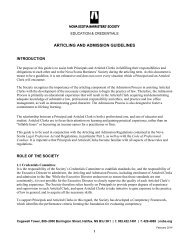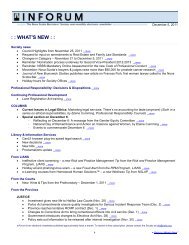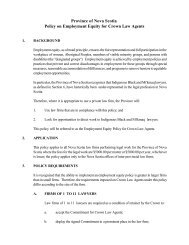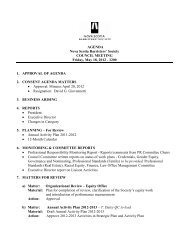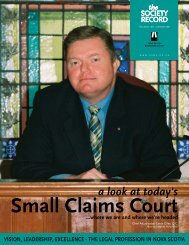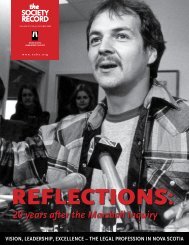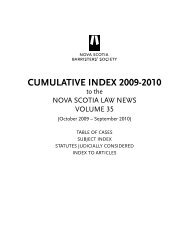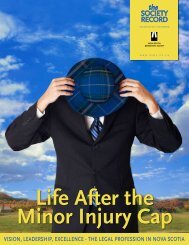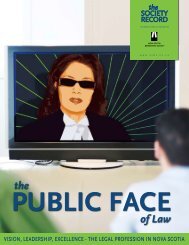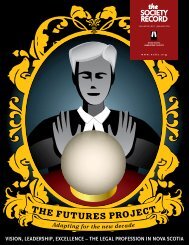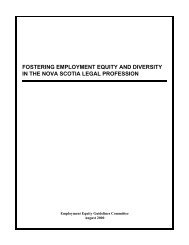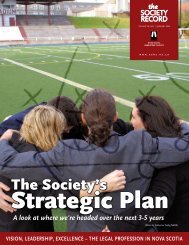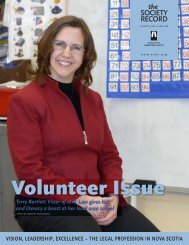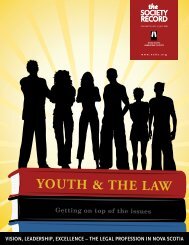the SOCIETY RECORD - Nova Scotia Barristers' Society
the SOCIETY RECORD - Nova Scotia Barristers' Society
the SOCIETY RECORD - Nova Scotia Barristers' Society
You also want an ePaper? Increase the reach of your titles
YUMPU automatically turns print PDFs into web optimized ePapers that Google loves.
say <strong>the</strong> public policy reasons are not strong enough to overcome a<br />
lawyer’s duty to act in <strong>the</strong> interests of clients. O<strong>the</strong>rs say lawyers are<br />
gatekeepers and should not be complicit in abusive transactions.”<br />
Brent Cotter, a professor in <strong>the</strong> College of Law at <strong>the</strong> University of<br />
Saskatchewan, emphasized in his presentation that ethical obligations<br />
are not uniform. “Government lawyers need to appreciate <strong>the</strong> way<br />
<strong>the</strong>y relate to <strong>the</strong> law is different and <strong>the</strong> way <strong>the</strong>ir client is approached<br />
is different,” he said.<br />
One distinct difference: government lawyers owe a duty of fair<br />
treatment to adversaries, Mr. Cotter stated.<br />
Ethical issues aren’t esoteric. They can hit at <strong>the</strong> heart of a lawyer’s<br />
practice. Meinhard Doelle, director of <strong>the</strong> Marine and Environmental<br />
Law Institute at Dalhousie, pointed out in on his talk that for students<br />
studying environmental law <strong>the</strong>re is often a moral and a practical<br />
dilemma. A desire to protect and defend <strong>the</strong> environment is what<br />
attracts many people to this area of law, but <strong>the</strong> reality is <strong>the</strong>re are few<br />
legal jobs that call for this outlook. Private practice is usually where<br />
employment is secured – and <strong>the</strong> landscape is very different for new,<br />
idealistic environment lawyers.<br />
“They will quickly find [<strong>the</strong>ir] views are at odds with <strong>the</strong> clients <strong>the</strong>y<br />
represent. It’s not only clients with different perspectives, so will <strong>the</strong>ir<br />
colleagues. In many cases, it’s a firm culture,” Mr. Doelle said.<br />
“That can create an unhappy situation,” he added. “Some choose to<br />
leave; some choose to do volunteer work.”<br />
Schulich professor Rollie Thompson noted in his remarks that although<br />
“context” is a word he threatens students not to use on tests, it is<br />
none<strong>the</strong>less critical to understanding how ethical decisions are reached.<br />
He left attendees with two critical – and unanswered – questions:<br />
• To what extent do entrants into law have to take ethical<br />
considerations into account – should students think about this?<br />
• To what extent are legal ethics better taught and understood in a<br />
contextual course ra<strong>the</strong>r than a survey course – does it provide a<br />
truer picture in <strong>the</strong> real world?<br />
It was left to Stephen Pitel, a professor in <strong>the</strong> Faculty of Law at<br />
Western University, to coalesce <strong>the</strong> discussion. He noted that while<br />
history helps us understand <strong>the</strong> ethical issues lawyers face today, <strong>the</strong>re<br />
are steps that practising professionals need to take to ensure <strong>the</strong>y<br />
understand <strong>the</strong>ir ethical obligations – and live by <strong>the</strong>m.<br />
“Can lawyers just be a mouthpiece for <strong>the</strong>ir clients where <strong>the</strong>re is no<br />
clear ethical violation?” he asked.<br />
The times have clearly changed – and yet so much remains <strong>the</strong><br />
same. Mr. Girard noted that selective enforcement has been an issue.<br />
Minority lawyers, for example, have historically been singled out<br />
more often for discipline.<br />
But <strong>the</strong> issue is very much alive today, said Mr. Pitel: “We have real<br />
concerns about whe<strong>the</strong>r enforcement is skewed against lawyers in<br />
smaller firms.”<br />
The elusive issue of ethics continues to evolve, along with <strong>the</strong> overall<br />
context.<br />
Photo by Nick Pearce/Dalhousie University<br />
(L to R): Tim Daley QC, Richard Devlin, Meinhard Doelle, Geoffrey Loomer, Stephen Pitel, Philip Gerard, Sarah Bradley,<br />
Rollie Thompson, Dean Kim Brooks, and Brett Cotter.<br />
Spring 2013 21



